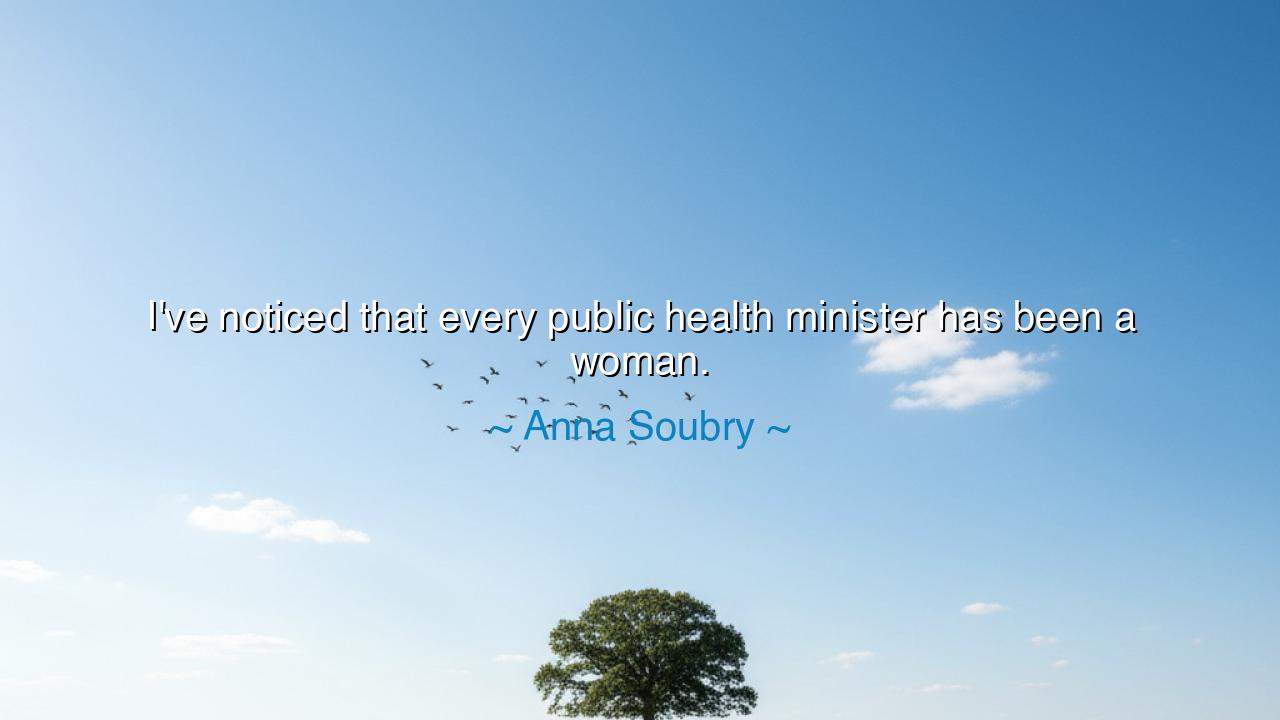
I've noticed that every public health minister has been a woman.






In the keen and reflective words of Anna Soubry, a voice from the modern halls of governance, there is an observation that pierces deeper than politics: “I’ve noticed that every public health minister has been a woman.” Though it may appear a simple remark, it carries within it centuries of meaning — the echo of an ancient truth about care, compassion, and the sacred duty to protect life. For in every age and every nation, the health of a people has rested not merely in medicine, but in mercy — and where mercy is called for, the spirit of womanhood has often stood at the front lines, both quietly and fiercely, holding the fabric of humanity together.
Anna Soubry, a British politician and advocate for justice and equality, uttered this reflection while serving in the United Kingdom’s parliament, noting that the role of public health minister, charged with safeguarding the wellbeing of millions, had consistently been entrusted to women. To her, this was not coincidence, but revelation — that in matters of health, where the work is less about power and more about protection, less about dominion and more about devotion, society has instinctively turned to those whose strength has long been bound to empathy. Hers was not a boast of gender, but a meditation on human nature itself — on the quiet heroism that so often wears the face of a woman.
From the earliest days of civilization, it was women who tended the sick, who comforted the wounded, who midwifed the next generation into being. The ancient Egyptians revered Isis, goddess of healing and motherhood; the Greeks honored Hygieia, daughter of Asclepius, whose very name gives birth to the word “hygiene.” In the medieval monasteries of Europe, women like Hildegard of Bingen studied herbs and medicine, merging science with spiritual care. Through war, famine, and plague, it was the women who stayed when others fled — whose hands, though gentle, became the firm pillars of life itself. Thus, the lineage of the public health minister is ancient, and in it lives the eternal archetype of the guardian and healer.
Consider the story of Florence Nightingale, who in the grim shadows of the Crimean War transformed the chaos of battlefield hospitals into sanctuaries of order and hope. Amid the cries of the dying, she moved like a living flame, bringing cleanliness where there had been filth, and compassion where there had been despair. She did not seek glory; she sought healing. Her lamp became a symbol of the light that never falters, even in darkness. In her, we see the very spirit that Soubry’s observation points to — that unwavering devotion to the welfare of others, a strength both tender and unyielding, which so often finds its fullest expression in the women who lead with heart.
Yet the words of Anna Soubry are not merely praise, but challenge. They ask of us: why has this burden so often fallen to women alone? Why has the care of the world — its healing, its nurturing, its moral restoration — been seen as a woman’s work, when it should be the calling of every soul, regardless of gender? For though women have borne this mantle with grace, the work of compassion is not theirs to carry alone. The public health minister, whether man or woman, must stand not as an administrator, but as a servant of life, a steward of the human body and the human spirit.
In these words lies a timeless teaching about leadership — that the highest form of power is care. To lead in health is to embrace the vulnerability of others as your own, to hold the pain of the people without letting it break you. This is why the feminine spirit — whether found in a woman or a man — is so essential to governance. It is the spirit that listens before it commands, that heals before it rules. It is the wisdom that sees the nation not as a machine, but as a living body, whose wounds must be tended with both precision and compassion.
So, let the lesson of Anna Soubry’s words be this: greatness in public service is not measured by dominance, but by devotion. The world needs more leaders who embody the courage of healers — those who protect life as fiercely as warriors defend kingdoms. Whether in the halls of power or in the humble corners of community, we must all become ministers of public health in spirit: tending to the wellbeing of one another, guarding against not only disease of the body, but the sickness of indifference.
And let us never forget that in every era, when humanity has faltered, it has often been the women — in name or in nature — who have stepped forward to restore its heart. So honor them, learn from them, and carry their example within you. For the future of our species depends not only on medicine, but on mercy — and in the balance between strength and compassion, we shall find our true health.






AAdministratorAdministrator
Welcome, honored guests. Please leave a comment, we will respond soon